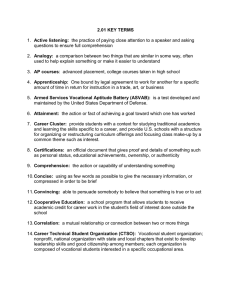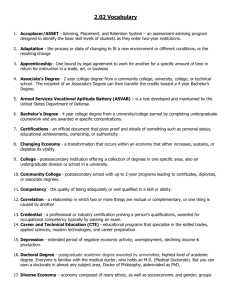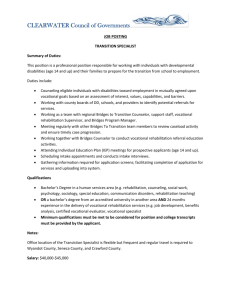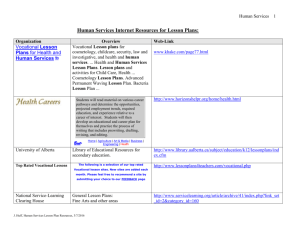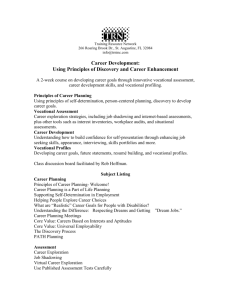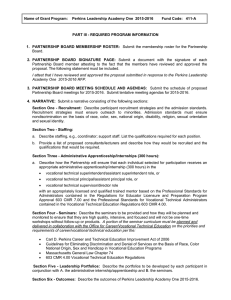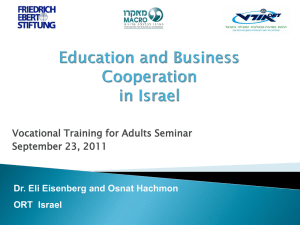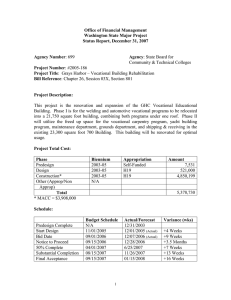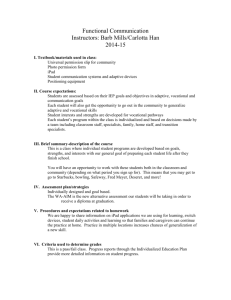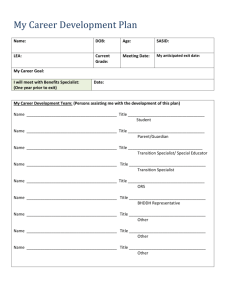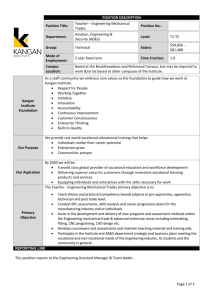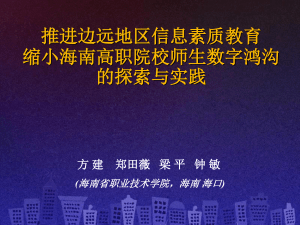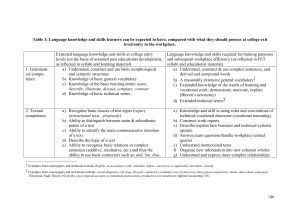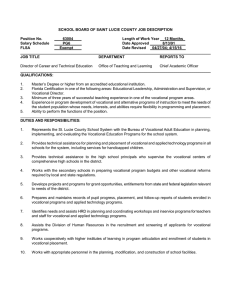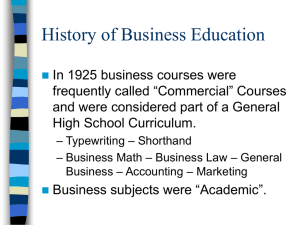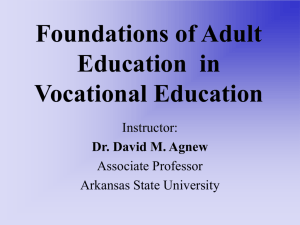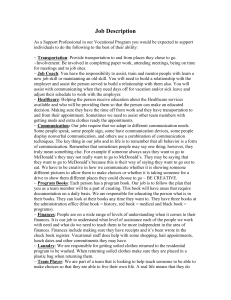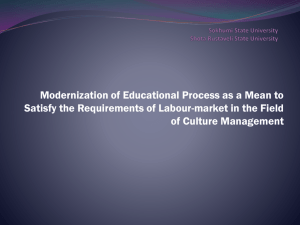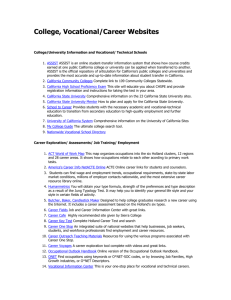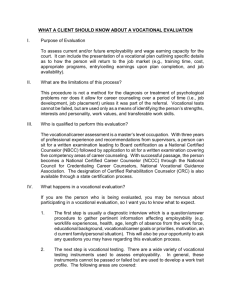CM 2.01 Vocabulary
advertisement
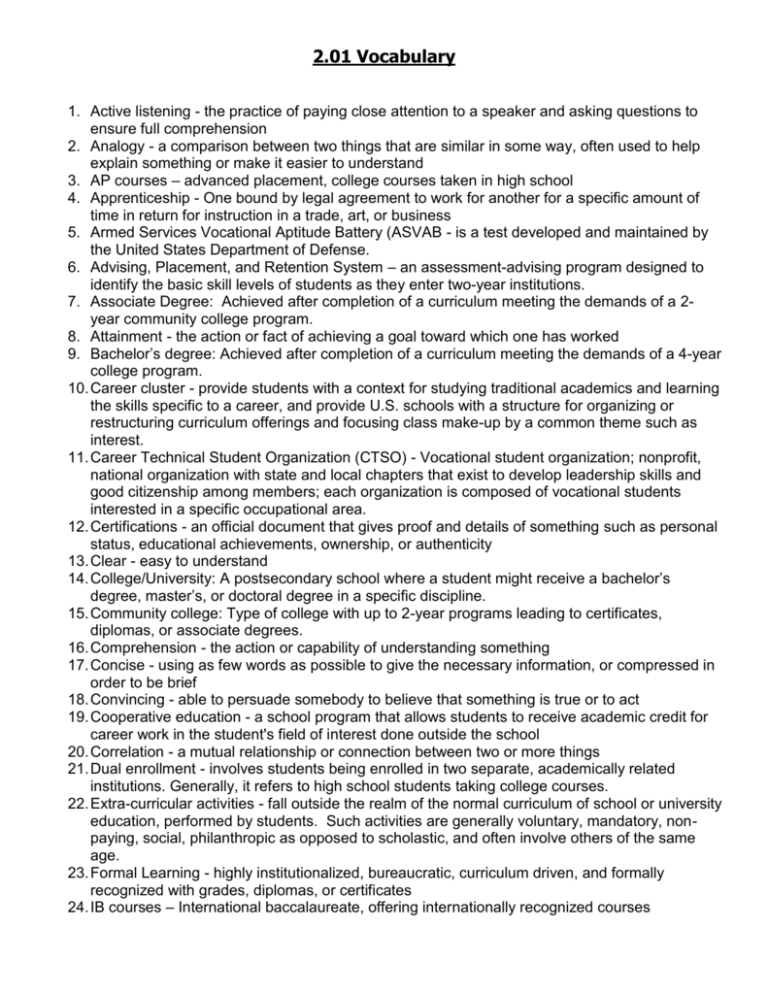
2.01 Vocabulary 1. Active listening - the practice of paying close attention to a speaker and asking questions to ensure full comprehension 2. Analogy - a comparison between two things that are similar in some way, often used to help explain something or make it easier to understand 3. AP courses – advanced placement, college courses taken in high school 4. Apprenticeship - One bound by legal agreement to work for another for a specific amount of time in return for instruction in a trade, art, or business 5. Armed Services Vocational Aptitude Battery (ASVAB - is a test developed and maintained by the United States Department of Defense. 6. Advising, Placement, and Retention System – an assessment-advising program designed to identify the basic skill levels of students as they enter two-year institutions. 7. Associate Degree: Achieved after completion of a curriculum meeting the demands of a 2year community college program. 8. Attainment - the action or fact of achieving a goal toward which one has worked 9. Bachelor’s degree: Achieved after completion of a curriculum meeting the demands of a 4-year college program. 10. Career cluster - provide students with a context for studying traditional academics and learning the skills specific to a career, and provide U.S. schools with a structure for organizing or restructuring curriculum offerings and focusing class make-up by a common theme such as interest. 11. Career Technical Student Organization (CTSO) - Vocational student organization; nonprofit, national organization with state and local chapters that exist to develop leadership skills and good citizenship among members; each organization is composed of vocational students interested in a specific occupational area. 12. Certifications - an official document that gives proof and details of something such as personal status, educational achievements, ownership, or authenticity 13. Clear - easy to understand 14. College/University: A postsecondary school where a student might receive a bachelor’s degree, master’s, or doctoral degree in a specific discipline. 15. Community college: Type of college with up to 2-year programs leading to certificates, diplomas, or associate degrees. 16. Comprehension - the action or capability of understanding something 17. Concise - using as few words as possible to give the necessary information, or compressed in order to be brief 18. Convincing - able to persuade somebody to believe that something is true or to act 19. Cooperative education - a school program that allows students to receive academic credit for career work in the student's field of interest done outside the school 20. Correlation - a mutual relationship or connection between two or more things 21. Dual enrollment - involves students being enrolled in two separate, academically related institutions. Generally, it refers to high school students taking college courses. 22. Extra-curricular activities - fall outside the realm of the normal curriculum of school or university education, performed by students. Such activities are generally voluntary, mandatory, nonpaying, social, philanthropic as opposed to scholastic, and often involve others of the same age. 23. Formal Learning - highly institutionalized, bureaucratic, curriculum driven, and formally recognized with grades, diplomas, or certificates 24. IB courses – International baccalaureate, offering internationally recognized courses 25. Informal Learning - organized learning outside of the formal education system; tend to be short-term, voluntary, and have few if any prerequisites. 26. Internship - a type of work experience for entry-level job-seekers 27. Interpersonal skills - concerning or involving relationships between people 28. Job shadowing: A short-term experience that allows the student to follow an experienced worker and see the day-to-day activities of a particular career. 29. Journey Worker: A certified, experienced, skilled craftsperson that has successfully completed an apprenticeship program. 30. Legible - (of handwriting or print) clear enough to read 31. Master’s degree: An advanced 2-year program completed after attainment of a bachelor’s degree. 32. Post-Secondary - education after high school. 33. Proprietary school: A privately owned school that operates for profit for those seeking vocational training. 34. Proofread - to read the text and mark corrections to be made 35. Secretary's Commission on Achieving Necessary Skills (SCANS) - appointed by the Secretary of Labor to determine the skills our young people need to succeed in the world of work 36. TEACH format – Think: What will this chapter be about? What do I need to learn from this chapter? Explain: Decide what you already know about the chapter. Ask: Who? What? Where? When? Why? Clues: Title, Key words, Headings, Illustrations Handwrite chapter highlights: Definitions, formulas and main concepts 37. Transcript - an official document showing the educational work of a student in a school or college 38. VOCATS: Vocational Competency Achievement Tracking System is a competency-based instructional management system that focuses on the individual student and tracks his/her achievement in relation to a predetermined set of core competencies. 39. Volunteer: A contribution of free labor, usually to a non-profit organization. 40. Volunteer experiences: Unpaid experiences; students work to get experience, contacts, or help out. The experiences are not necessarily career related and not usually supervised by school personnel.

